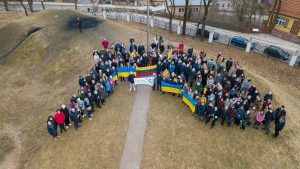Expressing solidarity with Ukraine and aiming to contribute to the integration of Ukrainians in Lithuania, Kaunas University of Applied Sciences (KUAS) invited Ukrainian citizens from 10 September to 30 November to participate in free Lithuanian language and culture courses organised by the Centre of Languages of the Faculty of Arts and Education of Kaunas University of Applied Sciences, financed by the Education Exchanges Support Foundation.
As a socially responsible higher education institution, Kaunas University of Applied Sciences took action in the first days of the war in Ukraine by suspending cooperation with the institutions of the Russian Federation and the Republic of Belarus, encouraging its community and society to support Ukraine, raising the Ukrainian flag on the Owl Hill as a symbol of solidarity, therefore the organisation of these courses was the next consistent step in providing aid to Ukraine and its citizens.
Willingly learned the Lithuanian language
10 students from Ukraine participated in the course. They were introduced to the peculiarities of the Lithuanian language, acquired A1-level writing, reading, listening, and speaking skills in Lithuanian, and learned basic phrases useful in everyday life. They also got acquainted with the symbols of Lithuania, stages of history, ethnoculture, the most important holidays and traditions, modern cultural and political life.
 “I had taught the Lithuanian language in various places, for example at the Adam Mickiewicz University in Poznań or the University of Illinois in Chicago – Lithuanian language was an optional subject there. Such students are very motivated. Of course, the reasons for learning Lithuanian are different – American students want to learn because they have Lithuanian roots or their second half is connected to Lithuania. Meanwhile, other things are important to Ukrainians – they seek smoother integration or simply want to learn the language of the country that is helping their country in such a difficult period.
“I had taught the Lithuanian language in various places, for example at the Adam Mickiewicz University in Poznań or the University of Illinois in Chicago – Lithuanian language was an optional subject there. Such students are very motivated. Of course, the reasons for learning Lithuanian are different – American students want to learn because they have Lithuanian roots or their second half is connected to Lithuania. Meanwhile, other things are important to Ukrainians – they seek smoother integration or simply want to learn the language of the country that is helping their country in such a difficult period.
During the course, students learned new words and phrases, completed written and oral tasks, worked individually and in groups – they came out with a full, meaningful programme,” says Dr. Giedrius Židonis, one of the teachers who conducted the course, and reveals that the course participants willingly learned the Lithuanian language and were interested in the similarities between the Lithuanian and Ukrainian languages.
“The attitude to learning the Lithuanian language was excellent at the beginning and remained so at the end of the course. In addition to all other subjects, the students were particularly interested in the similarities between the Lithuanian and Ukrainian languages, constantly discussing such words as cucumber, mushroom, garlic, etc.,” recalls Dr. G. Židonis and adds that these courses really facilitate the integration of Ukrainian citizens in Lithuania.
“Sometimes during classes, I asked students to share what new words they heard outside the university, what words they needed. The most diverse situations occurred, and all of them were related to communication. And when they managed to communicate and solve some situation in Lithuanian, the students hurried to share it during the meetings. Thus, such courses undoubtedly help to improve the integration of Ukrainians in Lithuania,” shares Dr. G. Židonis.
The course made integration easier
Students who came to Lithuania from Ukraine are happy that they got to know the country’s culture during the course, and the acquired knowledge of the Lithuanian language helps them feel more confident in everyday situations.
“Lithuanian language and culture course was really useful because I learned the basics of the Lithuanian language, got to know the country’s culture, traditions, and the Lithuanians themselves. Also, this course facilitated integration in Lithuania – in some everyday situations it became much easier to communicate with Lithuanians and better understand their mindset,” says Vadym Titov, who has been in Lithuania for 3 months. Mariia Storozhyk, who studied software engineering at Kyiv University and worked in an IT company, also sees the benefits of the course.
“The knowledge I gained during this course is really useful – I learned to communicate in Lithuanian in everyday situations, e.g. on the bus, in the store. After this course, I feel stronger and calmer if someone starts speaking to me in Lithuanian,” says M. Storozhyk, who is also in Lithuania for the third month.
Both students from Ukraine are happy with the Lithuanians’ hospitality, openness, and unity in supporting their country.
“I really like Lithuania and its people. I think we have a lot in common, which is why it is very easy to communicate with Lithuanians – the Lithuanians I met were very hospitable and caring. I am also very grateful for the support that Lithuania provides to Ukraine,” says V. Titov, a student of the Kharkiv National University of V.N. Karazin. M. Storozhyk agrees: “I think Lithuania is a great country, and Lithuanians are kind, open, and friendly”.
Renata Sedliorienė, Head of the Centre of Languages of the Faculty of Arts and Education of Kaunas University of Applied Sciences, is happy that although the Centre of Languages applied for the first time, it received funding and was able to contribute to the smoother integration of Ukrainian citizens in Lithuania.


